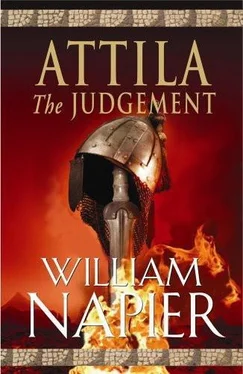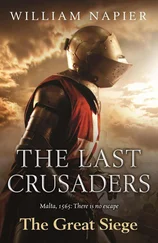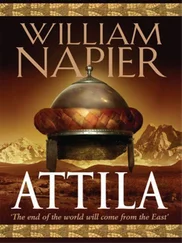William Napier - The Judgement
Здесь есть возможность читать онлайн «William Napier - The Judgement» весь текст электронной книги совершенно бесплатно (целиком полную версию без сокращений). В некоторых случаях можно слушать аудио, скачать через торрент в формате fb2 и присутствует краткое содержание. Жанр: Исторические приключения, на английском языке. Описание произведения, (предисловие) а так же отзывы посетителей доступны на портале библиотеки ЛибКат.
- Название:The Judgement
- Автор:
- Жанр:
- Год:неизвестен
- ISBN:нет данных
- Рейтинг книги:5 / 5. Голосов: 1
-
Избранное:Добавить в избранное
- Отзывы:
-
Ваша оценка:
- 100
- 1
- 2
- 3
- 4
- 5
The Judgement: краткое содержание, описание и аннотация
Предлагаем к чтению аннотацию, описание, краткое содержание или предисловие (зависит от того, что написал сам автор книги «The Judgement»). Если вы не нашли необходимую информацию о книге — напишите в комментариях, мы постараемся отыскать её.
The Judgement — читать онлайн бесплатно полную книгу (весь текст) целиком
Ниже представлен текст книги, разбитый по страницам. Система сохранения места последней прочитанной страницы, позволяет с удобством читать онлайн бесплатно книгу «The Judgement», без необходимости каждый раз заново искать на чём Вы остановились. Поставьте закладку, и сможете в любой момент перейти на страницу, на которой закончили чтение.
Интервал:
Закладка:
Each individual tactic of Aetius’ was paying off. The arrow-storm was weakened if not neutered by countercharge and good, old-fashioned shield discipline. The Hun cavalry charge, their horses tired before they started, was locked up against the legionaries and their implacable line of pikes. With the Visigothic cavalry and also the superb Augustan Horse and the Moors always ready to ride wide and sweep in from both left and right across the advancing enemy, it seemed that everything was going Aetius’ way. And so they fought on. Past noon, past mid-afternoon. Pedites ran with water. The Herculians dropped back, exhausted, and the Batavians took their place in the centre. The bodies of the enemy were piled high across the plain. The artillery from the hill worked on implacably. Yet the Huns kept coming.
Now it was a terrible battle of attrition. The Huns fought with ferocity but without imagination, without fresh tactics. Given that, Aetius knew grimly, it was just a matter of whether the Huns’ sheer weight of numbers would eventually triumph over the Romans’ exhaustion.
He rode behind the lines to see the wounded being bandaged and salved, the dead laid out for later burial. Already there were many there. He asked for numbers from only one legion, finding the primus pilus of the Herculians.
‘Over half my men, sir.’
‘Wounded?’
‘No, sir. Slain.’
He held the back of his hand to his mouth. All war was foul, but this was war at its foulest. A whole generation was being swept away in one day by the madness of one king.
An optio came running. ‘Sir, the Batavians are near exhaustion, sir.’
He nodded. ‘Pull ’em back. Send forward the frontier legions.’
‘And the Huns are launching fresh attacks on the hill, sir.’
Hell. That must not fall. ‘Send in the rest of the Palatine Guard to secure it.’
‘Sir.’
The twelfth hour from dawn? He reckoned so. Another four hours of daylight this long summer day. By nightfall it would be decided. And already they were stretched to breaking-point.
On the front line the battle was bloody, fierce and unrelenting. An ugly, stagnant stand-off, a process of the grimmest and goriest wastage. There was no room for the flamboyance of the wide-arcing cavalry charge now, no brilliant outflanking manoeuvres, nothing but the old moves of stab and slash, slogging it out knee deep in the reddening mud. In the melee, Knuckles, Arapovian and Malchus fought side by side as of old, protecting one another as well as holding back the Huns.
The Huns hated this hand-to-hand fighting. Their lassos were useless in the crush, their bows and arrows dead weight, and their swordsmanship poor and without order. Their small ponies, so rapid and sure-footed on the vast steppes of Asia, here only stumbled wearily over the heaps of the slain. The Romans gave no quarter. A few crossbowmen on the flanks picked off any Hun unhorsed and sent him reeling to hell.
King Theodoric came riding over to Aetius when two runners arrived at once.
‘Sir, the Palatine Guard are pinned down and surrounded on the hill.’
‘They must hold it – to the last man.’
‘The artillery boys are done for, sir. The Guard couldn’t save them.’
Yes, the arrow-firers had indeed fallen silent; the sling-machines worked no more.
‘And you? What happy news?’
The second runner, still gasping, said, ‘Sir, large numbers of the enemy seen drifting off north and west beyond the baggage wagons.’
‘Which people?’
‘Too far off to say, sir. But many, many deserting.’ King Thedoric punched his mighty fist into his palm. ‘This is going to be a close day of it, Roman.’
So it was. But there were no more tactical choices to be made. There weren’t enough men left for Aetius to make any new dispositions. They must just hold out.
King Theodoric shook his shaggy head, already pulling his horse round and moving back to the right wing. ‘It is time for the Visigoths to charge the enemy.’
‘You will leave our flank open!’ called Aetius. ‘You must hold it!’
Theodoric looked back. ‘With respect, old Roman friend, I am not, and never will be, under your command. But have no fear. My wolf-lords will finish the Hun with our charge. Your flank is safe.’
The sunlight was now behind them when the wolf-lords rode in, a single vast column of thousands of heavy-armoured horsemen. Ahead of them, a horde of many more, but already looking hesitant, indistinct, squinting into the sun. The Visigoths needed to ride wide indeed to avoid the piles of the slain. At their head rode their white-haired King, carrying no shield but only a two-headed battle-axe. Some in the Roman lines who saw him ride said he must have wanted to die.
Hun arrows came down onto the column as soon as their charge was spotted. But with shields raised and Spangenhelms lowered, they sustained little damage. And their huge chargers, despite having galloped all day, still had the power to gallop once more, thundering over the churned and deep-scored field, divots gouged out, manes flying, lances massed and lowered.
The Huns started to buckle and fall back as the thunderous column approached, but they could only fall back on their own rear ranks. They were packed too tightly to move, pushing and panicking and crying out when the wolf-lords slammed into them. And the Visigoths drove through with such ferocity that they were soon lost to Roman view, only the occasional banner showing above their heads.
For some minutes it was impossible to say what had happened. Meanwhile the last of the frontier legions had fought themselves to an exhausted standstill. Here and there, Hun horsemen came close enough to whip the pikes out of the ground and ride in over them. The centre, the very breastplate of the Roman force, was coming apart.
‘Send in every last man!’ roared Aetius. ‘Hold that line! Keep formation at all costs! Not a man to break or we are lost!’
The last few remnants, the Batavian special forces, the Breton volunteers, and the two hundred Celts with Lucius at their head, pushed forward through the ranks and gave their last-ditch support to the exhausted and ravaged legions. A pocket of Hun horsemen had broken through, wheeled, and were charging at the Roman front line from behind, curved swords whirling. The men looked over their shoulders and cried out, knowing they were about to be surrounded and cut down, whatever they did. It was at this moment in a battle, always always, when men broke and ran to save their skins and formation crumbled, that the day was lost.
But now the Huns themselves cried out and turned again to defend themselves. Two Roman horsemen rode into them at full pelt. One actually wielded a huge billhook from the saddle, whirling the long handle over his head and slicing through men’s chests and throats, roaring and spattered with blood.
The Hun horsemen fell apart. One tried to leap over the Roman line and flee, but a huge fellow with a weighted club knocked him clean out of his saddle, then drove his face in with a single stomp of his left boot. As the Roman turned back to regain the safety of his line, he reeled. The curved spike of a chekan sliced across his skull and he fell forward, his face a thick mask of blood. The Hun warrior, an old but muscular fellow with flying long grey hair and fine moustaches, galloped in again, swinging low off the side off his horse, thighs clamped tight, and was about to swing a second time with his chekan when a lean eastern swordsman leaped to stand over the fallen club-wielder, poised askance, sword level as the desert horizon. At the last second he ducked, stood again, whirled round and sliced his sword blade though a wide arc in a single sinuous movement. The old warrior flung his head back and howled, the chekan flying out of his hand as he clutched his thigh, cut through leather and flesh to the bone. His exhausted horse slowed to an absent-minded trot as it felt its rider’s grip loosen. The easterner sprinted after him, his sword still whirling. Then he stopped abruptly, and let the old warrior ride slowly back to the Hun lines, slumped in his wooden saddle.
Читать дальшеИнтервал:
Закладка:
Похожие книги на «The Judgement»
Представляем Вашему вниманию похожие книги на «The Judgement» списком для выбора. Мы отобрали схожую по названию и смыслу литературу в надежде предоставить читателям больше вариантов отыскать новые, интересные, ещё непрочитанные произведения.
Обсуждение, отзывы о книге «The Judgement» и просто собственные мнения читателей. Оставьте ваши комментарии, напишите, что Вы думаете о произведении, его смысле или главных героях. Укажите что конкретно понравилось, а что нет, и почему Вы так считаете.












